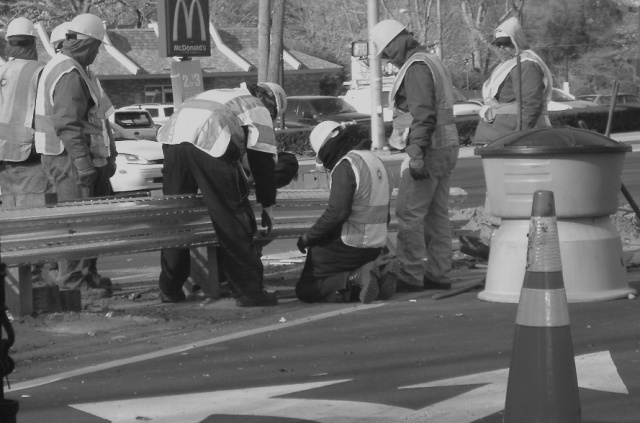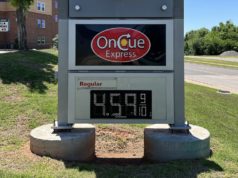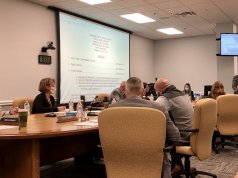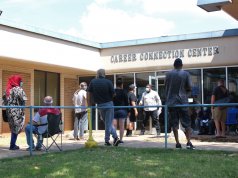
Across the nation, state legislatures and electorates are still debating one of the biggest issues in organized labor: Should private-sector unions be allowed to impose fees that, in effect, require workers to pay into unions whether they want to or not?
In other words, do people have a “right to work?”
While states like New Mexico and Missouri continue to debate various Right To Work proposals, Oklahomans have already spoken on the issue.
Fourteen years ago, Oklahoma television sets were awash in advertisements for and against that topic, which was presented to voters on a Sept. 25, 2001, special election in the form of State Question 695.
In one corner stood Oklahoma’s burgeoning Republican political leadership, hopeful to adopt pro-business policies and progress toward controlling the legislature for the first time in state history.
In the other corner — hoping to retain its full influence and prominence — stood a bedrock of Oklahoma’s long-time Democratic base: organized labor unions.
“It was a historic election,” said Marc Nuttle, a Norman attorney and international consultant who managed the “Yes” campaign.
The question was whether Oklahoma would become a “Right To Work” state. Moreover, SQ 695 proposed the following: “[The measure] bans any new employment contract that requires employees to resign from or belong to any union, pay union dues, or make other payments to a union.”
By a tally of 54.16 percent “Yes” to 46.84 percent “No,” Oklahoma became the first state to pass a Right To Work referendum since 1958.
Fourteen years later, neither Nuttle nor one of the principal players on the “No” side has forgotten the contentious campaign.
“Right To Work was a divisive issue. It was a political issue. It was made, more or less, to quiet the unions down,” said Jim Curry, president of the Oklahoma AFL-CIO. “But it didn’t really help the economy bring jobs to Oklahoma. They’ve widened I-35 since then, but there’s not that big flux of companies running up the border like our elected officials of the time would have had you believe.”
Curry is well aware of what Gov. Frank Keating and Republican members of Oklahoma’s congressional delegation said about Right To Work at the time. Thousands of union members had first elected him as Oklahoma president of the American Federation of Labor and Congress of Industrial Organizations in 1997.
“If anything, in my opinion, it hurt (the economy) because it hurt labor-management relations for many, many years after it passed,” Curry said in late August. “Just now, all of us can sit down and realize that labor and management need to work together to secure jobs — and better jobs — for Oklahoma, and that’s in everybody’s best interest.”
Looking back, Nuttle said he is glad the 2001 campaign remained as clean as it did, and he praised Curry for keeping rhetoric civil and not inciting riots.
“I have respect for unions. They play an important role, and as the world transitions, they have a role to play,” Nuttle said. “But it should be by freedom of choice.”
Freedom of choice was the message Nuttle and his team chose and stuck to when pitching SQ 695 to the public. It proved to be a smart play, the sort of sentiment that resonates with large swaths of the Oklahoma electorate.
“We ran the campaign as a basic matter of freedom,” Nuttle said. “Why shouldn’t you get to choose whether to join something or not?”
As Curry alluded to, another pitch used in support of SQ 695 was the idea that big employers were not coming to Oklahoma because of its closed-shop manufacturing and trade unions.
“I want my kids to be free to live here in Oklahoma,” said a theoretically random mother in the only 2001 campaign advertisement on YouTube. “We have to make the right choices for our children’s future. That’s why I’m voting yes on Right To Work.”
Curry said he remains baffled by the idea that Right To Work was ever expected to bring more jobs to Oklahoma.
“As far as I know, to date, 14 or 15 years after it passed, there’s only one company that ever said Right To Work was the reason they moved here,” Curry contends.
While Nuttle could not name any other companies that stated Right To Work factored into their decisions to move to Oklahoma, he said there have been some. He also said the issue was more about implementing the policy as part of a business-recruitment “arsenal” for a state facing competitive advantages such as not having a deep-sea port.
“We didn’t even know how important it was back then, but we had a sense of it,” Nuttle said, adding that major companies base their investments on 30-year pro formas. “High-tech companies, companies in aerospace, bio-medical companies … the (research and development) that is involved needs to be in a Right To Work state on a 30-year plan.
“Not being Right To Work is a risk because there could be a dispute of some sort or a strike — and you never know what could cause a strike. If (companies) don’t have any flexibility to work with their workforce, that could disrupt that 30 year pro forma.”
Curry said the reason unions opposed Right To Work in Oklahoma — and continue to oppose it in other states — is rooted in an idea of fairness. Federal law requires private-sector unions to represent both members and non-members during disputes with employers, something Curry said now happens under Right To Work rules. In Oklahoma, about 17,000 workers are represented by unions without being paying members.
“Say one of them that is not paying dues gets fired, the union is required under federal law to represent them and take them through grievance procedures and then for arbitration if they need to or have to, and arbitration always runs several thousand dollars,” Curry said. “The union is required to pay half the cost of that. You get these members who are not paying but who are receiving all the benefits, then the union has to spend money representing them.”
Nuttle said he would encourage the AFL-CIO to challenge that requirement in court.
“Why don’t they just refuse to do it? And the reason they don’t is that they want to force everyone to join a union,” Nuttle said. “Why don’t they just do a court test on it? But they don’t want the law to be changed.
“Nobody should be forced to take representation they don’t want or need. It’s an overstated need,” he said. “It is a ridiculous argument. If they’re of value and the employees want it, they can sign up for it.”
Curry disagrees, and he believes business leaders who push Right To Work rules are mostly interested in saving money for companies.
“The union wage always brings up the private-sector wage, and if the union wage goes down, so does the private sector,” Curry said. “That’s just the way it is. So those that are anti-union just want to drive the wage scale down, in my opinion.”
That and other negative predictions were part of the “No” campaign’s messaging in 2001. In an off-year election, the campaign received full attention from national labor bosses, with many ads being purchased and funded from a variety of union organizations.
“That was the largest media buy in the history of politics,” Nuttle said. “I don’t believe it’s ever been beat.”
Nuttle said the unions purchased about 3,000 rating points of television advertising. Typically, he said, 1,000 rating points means most of the TV-viewing public will see ads at least 15 times.
“Nobody had ever done that before,” Nuttle said of the large union television buys. “They thought they’d spend so much money that they’d blow us away.”
Nuttle noted that Oklahoma is the second-most efficient media buy for campaigns in the country, with the vast majority of the state’s population being covered by the Oklahoma City and Tulsa television markets.
“There was quite an academic study done on the whole election. The last 10 days of the campaign, we had a full poll every night.” Nuttle said. “The one thing that’s been proven — 3,000 rating points isn’t any better than 1,000.”
Both Nuttle and Curry said the campaigns were affected heavily by the events of Sept. 11, which was just two weeks before the vote.
Nuttle said the “Yes” campaign pulled its ads off of airwaves almost immediately, but he said some union ads remained up for almost 48 hours. As a veteran political consultant, Nuttle looks back and sees that as a tactical mistake made by the out-of-state union advertisers, many of whom presumably “were in shock” by the tragic events.
“We revamped our campaign,” Nuttle said. “We went non-partisan. Everybody knows where (Gov.) Frank (Keating) stood on this issue. But we filmed him in his office in the Capitol and said, ‘Look, I don’t know where you are on this issue, but whatever you do, get out and vote. Show these people they can’t intimidate us. This is a great country. Democracy is the way of the future. Whatever you do in this election, get out and vote.’ That was the message, and it was the highest turnout in an off-year election for a legislative issue in the history of the state.”
Nuttle said the polls had been trending in his camp’s favor prior to that, but he said the way they handled the suddenly changed political climate helped.
“It was an incredible campaign,” Nuttle said.





















